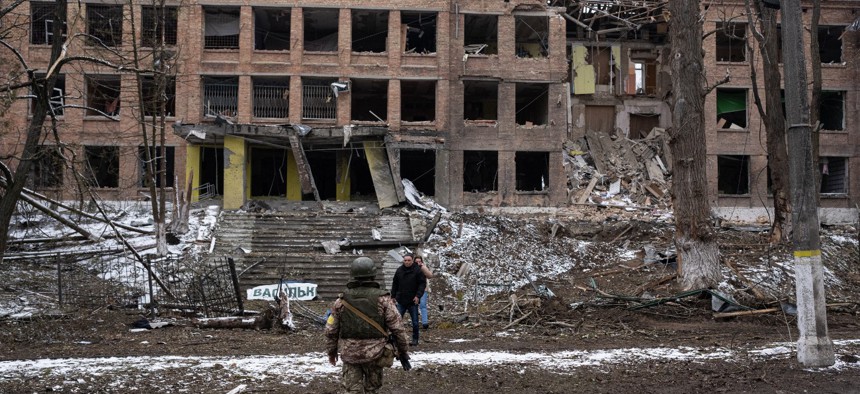
A high school building is seen damaged after Monday's Russian missile attacks in Vasylkiv, Kyiv Oblast, Ukraine. Wolfgang Schwan/Anadolu Agency via Getty Images
The U.S. Global Media Agency Is Working to Protect Journalists While Covering the Ukraine War
Voice of America and others are combating censorship attempts from Russia.
The U.S. government funded news networks are working to cover the war in Ukraine while also ensuring their journalists’ safety.
Last week, Russian President Vladimir Putin launched a full scale invasion of Ukraine, which President Biden called “unprovoked and unjustified.” Since the war was launched, 136 civilians have been killed and 400 civilians have been injured, but these numbers are likely higher, said the United Nations’ human rights office on Tuesday as the invasion intensified.
“[The U.S. Global Media Agency’s] networks have historically had a robust presence throughout Ukraine,” Laurie Moy, director of public affairs for the agency, told Government Executive on Monday. “Due to security considerations, we can’t share specific numbers of journalists who were or continue to remain in Ukraine.”
The agency enacted a contingency plan for a “worst case scenario” in December 2021, which included “evacuating the most vulnerable of our journalists,” she continued. “We are doing everything possible to protect the safety of our journalists while preserving our ability to produce and disseminate programs from inside of Ukraine.”
This is similar to the agency’s plans after the Taliban took over Afghanistan as the United States was completing its withdrawal.
Yolanda López, acting director of Voice of America, which is an entity of the global media agency, said VOA “is covering the Russian invasion of Ukraine on the ground in Ukraine, from Washington, D.C., the United Nations and in many locations around the globe.”
The agency’s news center covers the story in English and then the stories are translated into 47 languages. The VOA Ukrainian service added an hour of programming per week to give more coverage to the crisis, she added.
For security reasons López couldn’t give the number of stringers in Ukraine, but she said the VOA News Center has two reporters on the ground in Ukraine. Also, the VOA Ukrainian service has 10 full-time employees and eight contractors in D.C.
On Feb. 27, Russia’s media regulator sent letters to at least 10 media outlets threatening to block their content that they think is false or describes troop movements. This included “Current Time,” which is a Russian-language digital news network from VOA and Radio Free Europe/Radio Liberty, which is a non-profit organization that receives grants from the Agency for Global Media. Then on Monday, the regulator followed through on the threat, RFE/RL said.
“The Kremlin is desperate to prevent the Russian people from learning the facts about the death and destruction the Russian invasion of Ukraine is causing,” said Jamie Fly, Radio Free Europe/Radio Liberty president and CEO, in a statement. “We will continue to provide the truth to the Russian people at this critical moment.”
López said VOA "continue(s) to monitor the situation closely and adjust accordingly." She previously told Government Executive that “our audience in Russia deserves access to free press and open discussion, which the authoritarian regime in Moscow is trying to suppress” and VOA will “continue to inform and engage them through ‘Current Time’ and across other platforms, despite the censorship attempts by the Kremlin.”
Overall, speaking of the crisis in Ukraine, Radio Free Europe/Radio Liberty “prioritizes the security of our journalists wherever they work,” Martins Zvaners, RFE/RL deputy director for external affairs, told Government Executive.
“Our journalists are not employed by the U.S. government and are usually citizens of the countries they report from. We have hundreds of Ukrainian and Russian journalists working for us across Ukraine and Russia,” he continued. “When individuals come under direct threat, we attempt to move staff to more secure locations.”
He added, “We join other news organizations in urging that all governments respect the right of journalists to do their jobs, including coverage of military hostilities, without harassment or fear of physical harm.”
This article was updated with additional comment from VOA at 3:35 p.m.







